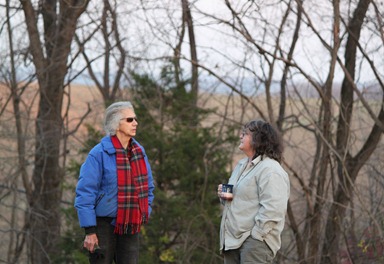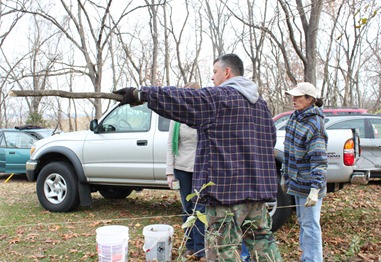Transformation in Community
As we accept the Good News that Jesus is present with us today, we are called to make radical changes in our lives. These changes go far deeper than any that we could effect on our own, touching not only our outward behavior, but also our inward life. And the Holy Spirit is active not only in the individual human heart, but flows throughout all relationships. God works in groups as well as in the solitary heart. In fact, because human beings are social creatures, a great deal of God’s work on the individual is done in the context of community.
far deeper than any that we could effect on our own, touching not only our outward behavior, but also our inward life. And the Holy Spirit is active not only in the individual human heart, but flows throughout all relationships. God works in groups as well as in the solitary heart. In fact, because human beings are social creatures, a great deal of God’s work on the individual is done in the context of community.
If we are to experience the kind of transformation that characterized the early Church, we must seek God’s face together, not only as a loose collection of individuals, but as a body. Quakers use the term “body” to refer to united communities of Friends, because we have a sense that a group that is brought into unity under the headship of Christ is no longer merely the sum of the individual members; these individuals have become something more, something that includes but transcends all of our unique personalities. When we are living together in the Spirit, we find that we have truly become the Body of Christ.
The early Christians discovered this miraculous development on the day of Pentecost, when the Holy Spirit came with power and gathered the Church together as a spiritual communion. Jews who were visiting Jerusalem from across the Mediterranean were swept up in this movement of the Spirit, and rapidly became a body of thousands (Acts 2). The same thing happened in the early days of the Quaker and Pentecostal movements, as large numbers of people were knitted together in the bonds of love and devotion to God.
gathered the Church together as a spiritual communion. Jews who were visiting Jerusalem from across the Mediterranean were swept up in this movement of the Spirit, and rapidly became a body of thousands (Acts 2). The same thing happened in the early days of the Quaker and Pentecostal movements, as large numbers of people were knitted together in the bonds of love and devotion to God.
The Spirit continues to move. Christ continues to gather his people today. There are congregations, intentional communities and mission groups around the globe that are daily being brought into unity through Christ’s Spirit. In the presence of the Risen Lord, we discover that we have become members of one another.
The Individual and Membership
Membership means coming into relationship with others who are committed to following Jesus, placing our lives in the context of his Life. In a world that values competition, Christ shows us how to bear one another’s burdens and share our joy. In a society that is often hopeless, the Holy Spirit reveals the hope of transformation and justice. In a culture where the individual is regarded as the supreme measure of what is to be valued, our Heavenly Father shows us that his plan flows through neighborhoods and families, organizations and nations. We find that we are members of one other; together we are reorienting our lives to serve God and embody the love and justice of Jesus Christ.
Life. In a world that values competition, Christ shows us how to bear one another’s burdens and share our joy. In a society that is often hopeless, the Holy Spirit reveals the hope of transformation and justice. In a culture where the individual is regarded as the supreme measure of what is to be valued, our Heavenly Father shows us that his plan flows through neighborhoods and families, organizations and nations. We find that we are members of one other; together we are reorienting our lives to serve God and embody the love and justice of Jesus Christ.
We do not select the membership of the Church. Membership is a spiritual reality that we as human communities can acknowledge – but we cannot create it. It is God who draws us together and unites us in the Spirit. When we are open to God’s power among us, we will find ourselves drawn into community with an unlikely assortment of people. Christ invites all people into his abundant life, gathering us and forging the bonds of brotherhood and sisterhood in our Meetings.
While it is Christ alone who can gather us together as a body, there is value in recognizing his unifying work. By recording the gift of membership as a community, we recognize the reality of the Church; and we commit ourselves to submitting to one another in Christ. Just as two people are united by God in the bond of marriage, communities can also be united under the headship of Christ. And, just as we formally recognize and support marriage as a community, so should we also acknowledge and support membership.
membership as a community, we recognize the reality of the Church; and we commit ourselves to submitting to one another in Christ. Just as two people are united by God in the bond of marriage, communities can also be united under the headship of Christ. And, just as we formally recognize and support marriage as a community, so should we also acknowledge and support membership.
When we formalize the marital union of a couple, we promise to be available to them, to counsel them, to care for them as their relationship matures, deepens, and goes through inevitable rough patches. At the same time, we promise to hold the couple accountable to their promises before God and the Church. If there is trouble in the relationship, we as witnesses to the marriage have a responsibility to offer aid and counsel. By formalizing the marriage, we take responsibility for it as a community.
Just as we have a responsibility to nurture and care for marriages, so too must we care for membership, which is a fundamental building block of a healthy congregation. By formally recognizing membership, we have the opportunity to commit ourselves to a shared life of discipleship, holding each other accountable and submitting ourselves to Christ and one another. This mutual submission in Christ is at the heart of covenantal community.